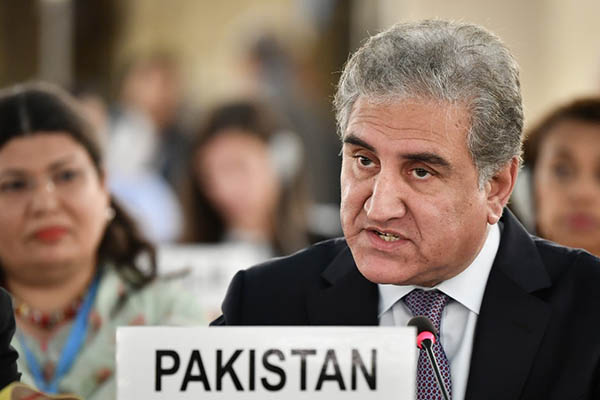
Fabrice Coffrini—AFP
In address to Human Rights Council, foreign minister Qureshi says the disputed region has become the ‘largest prison on the planet’
Pakistan’s foreign minister demanded on Tuesday that the U.N. launch an international investigation into the situation in India-held Kashmir, warning of the risk of “genocide” in the Muslim-majority region.
“The people of Indian Occupied Jammu and Kashmir are apprehending the worst,” Shah Mehmood Qureshi told the U.N. Human Rights Council in Geneva, adding “I shudder to mention the word genocide here, but I must.”
Delhi imposed a military clampdown on India-held Kashmir from Aug. 5 to prevent unrest as it revoked the disputed region’s autonomy. Mobile phone networks and the internet are still cut off in all but a few pockets.
“For the last six weeks, India has transformed Occupied Jammu and Kashmir into the largest prison on this planet,” Qureshi said. “The forlorn, traumatized towns, mountains, plains and valleys of Indian Occupied Jammu and Kashmir reverberate today with the grim reminders of Rwanda, Srebrenica, the Rohingya, and the pogrom of Gujarat,” he said.
The minister accused India of having arrested more than 6,000 people without due process. Many had been “shipped to jails all over India,” he said.
India’s vice-minister of foreign affairs, Vijay Thakur Singh, slammed Pakistan’s “false allegations and concocted charges against my country,” despite independent media reports all claiming the same, and told the Human Rights Council that “this fabricated narrative comes from the epicenter of global terrorism.”
“The temporary preventive measures” introduced by India in Kashmir “were needed to ensure security in the face of credible threats of cross-border terrorism,” she said, insisting that the issue was “entirely internal to India.”
India-held Kashmir has seen a decades-old armed rebellion against Indian rule with tens of thousands, mostly civilians, killed.
Qureshi meanwhile denounced India’s references to “cross-border terrorism” to justify its crackdown as a “red herring to divert international opinion,” and said he feared India might “even attack Pakistan.” He also insisted that India’s labeling of the Kashmir situation as an “internal affair” was “patently false,” pointing out that the matter had been on the U.N. agenda for seven decades.
The minister urged the council to heed recommendations by U.N. rights chief Michelle Bachelet and her predecessor Zeid Ra’ad Al Hussein to launch a so-called international Commission of Inquiry (COI) into the Kashmir situation. A COI is one of the U.N.’s highest-level probes, generally reserved for major crises like the Syrian conflict.
The council must “take steps to bring to justice the perpetrators of human rights violations of the innocent Kashmiri people, and in this context, constitute a Commission of Inquiry,” Qureshi said. “If India has nothing to hide, it should allow unhindered access to the Commission of Inquiry,” he insisted. Pakistan was willing to provide access to its side of the so-called Line of Control, he added.
Pakistan is expected to present a resolution to the council for consideration by the end of the 42nd session on Sept. 27.
At Monday’s opening of the council session, Bachelet also voiced alarm at the situation in Kashmir. She had “appealed particularly to India to ease the current lockdowns or curfews, to ensure people’s access to basic services, and that all due process rights are respected for those who have been detained,” she said. “It is important that the people of Kashmir are consulted and engaged in any decision-making processes that have an impact on their future,” she added.
